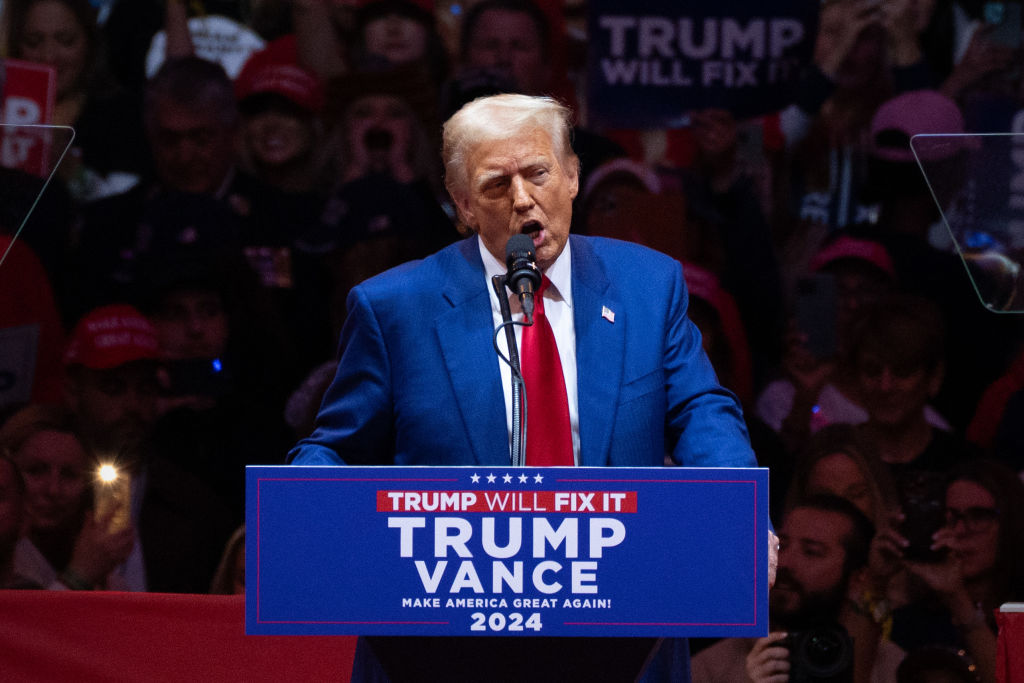The Impact of Tony Hinchcliffe's Set at Trump's Rally
Trump Rally Raises Complex Question: Are All Republicans Racist?

Source: The Washington Post / Getty
This past weekend, former President Donald Trump held a rally at Madison Square Garden in New York City, and it sparked controversy well beyond political lines. The event itself drew the expected mix of supporters and protesters, but it wasn’t Trump’s speech that grabbed the most attention — it was the set by shock comedian Tony Hinchcliffe. Known for his controversial style, Hinchcliffe’s jokes quickly turned into a point of contention, particularly his comments about Puerto Rico and Latinos, which many found offensive.
The incident raises a broader question: what role, if any, should comedy play in political discourse?
Comedy has long been a part of American political culture, with late-night hosts, stand-up comics, and satirical programs often poking fun at politicians and policies. For some, humor is a way to critique those in power, offering sharp observations that make complex issues more accessible. But when does political comedy cross the line, and should it?
Trump’s choice to feature Hinchcliffe at a rally suggests an embrace of shock humor that might appeal to his most loyal supporters but risks alienating others, including moderate Republicans and swing voters. The outrage that followed prompted a wider discussion on social media about the ethics of humor in politics, with many questioning whether certain jokes reinforce harmful stereotypes instead of challenging them.
So, where is the line between political satire and offensive humor?
Comedians like Jon Stewart, Trevor Noah, and Hasan Minhaj have used comedy to draw attention to issues and generate constructive dialogue. In contrast, shock comedy, often relying on controversial stereotypes, can intensify divisions rather than bridge them. When it comes to political gatherings, the tone of humor used can influence how an audience perceives the issues at hand.
Whether comedy is used to enlighten or inflame, Trump’s rally highlights how closely entertainment and politics are intertwined. Comedy can serve as a tool for humanizing political figures and connecting them with audiences, but it also has the power to underscore divisive rhetoric.
This incident also raises the complex question: are all Republicans racist? While it’s certainly not accurate or fair to generalize, the inclusion of racially insensitive humor in a political setting perpetuates negative associations. For those who believe in the Republican platform but reject such stereotypes, Trump’s rally may present a difficult choice between supporting their party or distancing themselves from problematic narratives.
In the end, Trump’s NYC rally shows how comedy in politics can be a double-edged sword — it can provide relief and critique, but it also carries the risk of crossing lines that some audiences may find unacceptable. And in an age where words have immense influence, the choice of humor is one that can reflect a candidate’s values just as much as their policies.
Related Stoires:
Like Father, Like Son: Video Shows Donald Trump Jr. Call His Teen Daughter ‘Sexy’ At RNC
Trump Calls Gaffe Videos Played By House Democrats ‘AI’ After Republicans Label Biden ‘Senile’
5 Takeaways From Trump’s ‘Insulting’ NABJ Interview With Black Women Journalists
- WORLD AIDS DAY: Remembering Black Celebrities We Lost
- EXCLUSIVE: Tamar Braxton On New Album, Internet Rumors, & TV Drama
- Reunited! Did Russell Simmons Repair His Relationshion With His Daughter Aoki?
- Megan Thee Stallion Wins Defamation Lawsuit
- Dear Future Wifey Wedding Goes Viral With Mystery Bride Reveal






